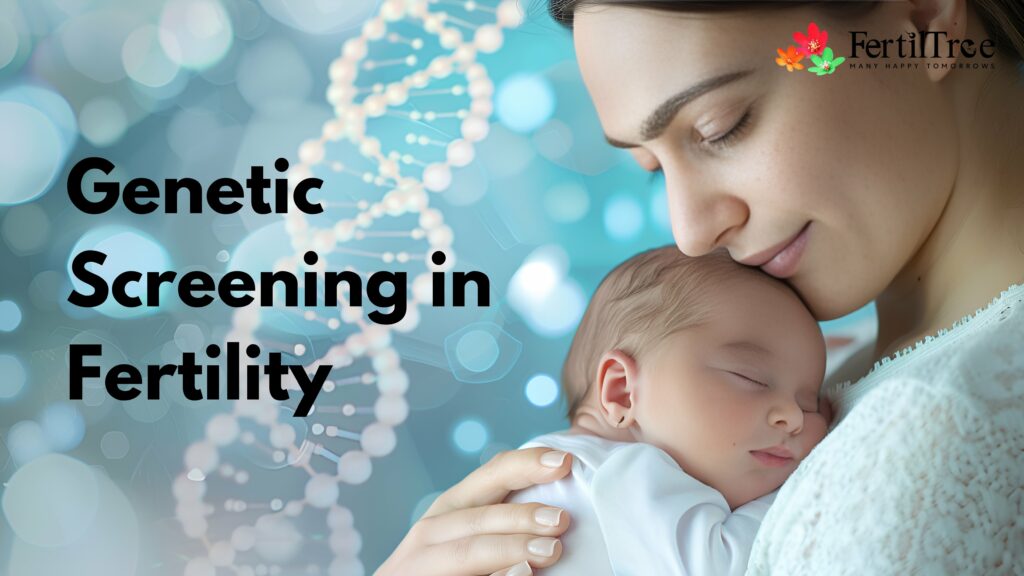
When you’re struggling to conceive — or preparing for IVF — it’s natural to wonder:
“Is there something deeper going on that we’re not seeing?”
That’s where genetic screening comes in. Think of it as looking beneath the surface — into your DNA, your embryo’s chromosomes, and sometimes even your partner’s genes — to ensure that you’re giving your future baby the best possible start.
Let’s break down what you really need to know about genetic testing in fertility — minus the medical jargon.
Q1: What exactly is genetic screening in fertility treatment?
It’s a set of tests used to identify genetic abnormalities that may affect fertility, embryo development, or increase the risk of miscarriage or inherited conditions.
There are three main types:
– Carrier screening – checks if either partner carries genetic conditions (e.g., thalassemia, cystic fibrosis)
– PGT-A (Preimplantation Genetic Testing for Aneuploidy) – tests embryos created through IVF to check for chromosomal issues
– PGT-M – used when a known inherited disease runs in the family
Q2: Do all couples need to do this?
Not always — but your doctor may recommend it if:
– You’re above 36 years of age
– You’ve had 2 or more miscarriages
– You’ve had failed IVF cycles
– There’s a known genetic condition in the family
– You want to reduce the risk of passing on inherited disorders
Q3: How does PGT help in IVF?
If you’re going through IVF, Preimplantation Genetic Testing (PGT) allows us to screen embryos before transfer. This can:
– Increase pregnancy success rates
– Reduce the risk of miscarriage
– Help avoid repeated failed cycles
– Support single embryo transfer with confidence
– Minimize emotional and financial stress
Q4: Can genetic screening prevent abnormalities in the baby?
It can’t fix genes, but it can help avoid transferring embryos with known abnormalities. In conditions like thalassemia major or Down syndrome, screening can help prevent transmission by selecting healthy embryos.
Q5: Is this the same as prenatal testing?
No — prenatal tests (like NIPT or amniocentesis) are done after conception. Genetic screening in fertility is done before implantation, giving you more control early on.
Q6: Is it safe? Does it affect my embryos?
Yes. PGT is done using a tiny biopsy from the embryo’s outer cells (not the part that becomes the baby). When performed in a well-equipped lab, it is safe and doesn’t harm the embryo’s viability.
At Fertiltree, we are proud to be pioneers in the field of embryo biopsy for PGT in India. Our embryology lab was among the first to introduce and perfect this delicate procedure.
Embryo biopsy is a fine art, and our highly experienced embryologists are specially trained to perform it with the utmost precision, care, and safety. Your embryos are in expert hands — every step is taken to protect their potential.
Q7: Are there any limitations?
Yes:
– PGT doesn’t guarantee pregnancy
– It doesn’t test for all diseases
– Results can sometimes be inconclusive
– It adds cost and time to IVF
Q8: Should I get tested even if we’re planning natural conception?
If you have a family history of genetic conditions or belong to a high-risk community (e.g., for thalassemia), carrier screening through a simple blood test is strongly advised.
Q9: What about Whole Exome Sequencing (WES) and Karyotyping?
At our clinic, we offer advanced tools like Whole Exome Sequencing (WES) and Karyotyping when clinically indicated.
**WES** examines all the protein-coding regions of your DNA to identify rare or hidden genetic mutations that may impact fertility, recurrent pregnancy loss, or embryo quality. It is especially useful in couples with unexplained infertility or repeated IVF failures where standard tests are normal.
**Karyotyping** looks at the structure and number of chromosomes in both partners. Structural abnormalities or translocations can often be silent yet responsible for

